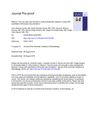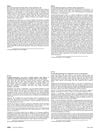Search
forProducts matching "topical finasteride dutasteride"
Tracking 2 products like 11 Duderma and 95 FinoDuta from by companies like MinoxidilMax. View all 2 products »
Sort by
Research
630-660 / 1000+ resultsresearch Effectiveness of the Active Ingredients (Capixyl, Procapil, and Rosemary Extract) of the Trust Tonic for the Treatment of Androgenetic Alopecia in Comparison to Minoxidil
The Trust tonic is more effective than minoxidil for treating hair loss.

research Perspectives on MicroRNAs Targeting DKK1 for Developing Hair Regeneration Therapy
Targeting a protein that blocks hair growth with microRNAs could lead to new hair loss treatments, but more research is needed.
research Molecular Basis of Androgenetic Alopecia

research Application of Ethanol Extracts From Alnus Sibirica Fisch. ex Turcz in Hair Growth Promotion
Extracts from Alnus sibirica and oregonin may help with hair growth and prevent hair loss.

research The Adverse Effects of Commonly Used Medications on Male Fertility: A Comprehensive Review
Some common medications may harm male fertility by affecting hormones, sperm production, and sexual function.
research Hormonal and Genetic Etiology of Male Androgenetic Alopecia
research Regulatory Effect of Cannabidiol on Decreased β-Catenin Expression in Alopecia Models by Testosterone and PMA Treatment in Dermal Papilla Cells
CBD may help restore hair growth-related protein levels in alopecia caused by hormones or other factors.

research Utility of Trichoscopy
Trichoscopy helps diagnose and monitor hair and scalp problems without needing many biopsies.

research Synergistic Phytochemical and Pharmacological Actions of Hair Rise Microemulsion: A Novel Herbal Formulation for Androgenetic Alopecia and Hair Growth Stimulation
Hair RiseTM microemulsion effectively promotes hair growth and treats hair loss better than standard treatments.

research Drugs and Androgenetic Alopecia: What to Look Out For
Certain drugs can worsen hair loss in people prone to androgenetic alopecia.

research Oral Supplementation with L-Cystine, Serenoa Repens, Cucurbita Pepo, and Pygeum Africanum in Chronic Telogen Effluvium and Androgenetic Alopecia: A Double-Blind, Placebo-Controlled, Randomized Clinical Study
The supplement significantly improves hair density and appearance in people with hair loss.

research Prospective Efficacy and Safety Study of an Innovative Kerascalp Hair Growth Serum in Mild-to-Moderate Alopecia in India: Regrowth Study
Kerascalp hair serum was found to be safe and effective in improving hair growth and strength in people with mild to moderate hair loss.

research Hair Growth Effect of TS-SCLF from Schisandra Chinensis Extract Fermented with Lactobacillus Plantarum
TS-SCLF from fermented Schisandra chinensis may promote hair growth and improve hair quality.

research Development and Evaluation of Dutasteride Nanoemulgel for Topical Delivery Against Androgenic Alopecia
The new dutasteride gel improves hair growth for treating baldness.

research Comparison Between Topical Minoxidil 5% Alone Versus Combined With Dutasteride (Topical 0.02% Through Microneedling Or Oral 0.5 Mg) In Treatment Of Androgenetic Alopecia
Combining Minoxidil with topical Dutasteride via microneedling is the most effective and safe treatment for hair loss.

research Dutasteride for the Treatment of Androgenetic Alopecia: An Updated Review
Dutasteride works better than finasteride for hair loss and has mild, reversible side effects.
research Update Treatment of Male Androgenetic Alopecia
The best treatment for male pattern baldness is a combination of topical minoxidil and oral finasteride.

research The Current Treatments and Perspectives for Androgenetic Alopecia
Finasteride and minoxidil are the main effective treatments for hair loss from androgenetic alopecia.

research The Inflammatory Component of Androgenetic Alopecia
Androgenetic alopecia, a genetic disorder affecting up to 50% of adults, is caused by an excessive response to androgens leading to hair follicle shrinkage. Treatments include FDA-approved drugs, other therapies like low-dose oral minoxidil, and hair transplantation.

research The Challenging Role of Antiandrogens in the Management of Polycystic Ovary Syndrome
Antiandrogens are used to manage polycystic ovary syndrome by reducing androgen levels or controlling their effects, often combined with lifestyle changes and other treatments.

research Reply to: Very-Low-Dose Oral Minoxidil in Male Androgenetic Alopecia: A Study with Quantitative Trichoscopic Documentation
Low-dose oral minoxidil effectively treats mild-moderate male hair loss, alone or combined with other therapies.

research Dutasteride for Men with Androgenic Alopecia Unresponsive to Finasteride

research Enabling Finasteride 1 mg Users to Further Improve Hair Pattern: A Randomized, Double-Blind, Placebo-Controlled Trial of a Novel Product
The new topical product combined with finasteride significantly increased hair thickness without side effects.

research Finasteride Treatment of Hair Loss in Women
Finasteride may help some women with hair loss, but better options exist.

research Interventions for Female Pattern Hair Loss
Topical minoxidil improves female pattern hair loss, finasteride not effective, laser devices show mixed results.

research Rebalance of the Scalp Microbiota by a Multifunctional Ingredient
Dutasteride improved hair density and thickness in men not helped by finasteride, with minimal side effects.
research The Efficacy and Safety of Oral and Topical Spironolactone in Androgenetic Alopecia Treatment: A Systematic Review
Spironolactone can effectively treat hair loss with manageable side effects.

research Familial Frontal Fibrosing Alopecia Treated With Dutasteride, Minoxidil, and Artificial Hair Transplantation
Treatment with dutasteride, minoxidil, and artificial hair transplantation improved appearance but caused folliculitis.

research 63-Year-Old Female with Diffuse Thinning of the Hair
Androgenetic alopecia, a common hair loss condition, can be treated with topical minoxidil, oral finasteride, or oral spironolactone, and new treatments like platelet-rich plasma, low-level laser therapy, and janus-kinase inhibitors are being explored.